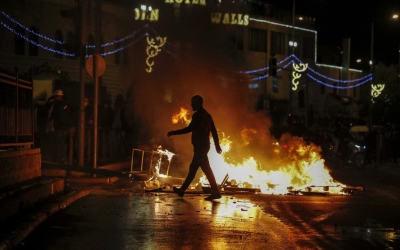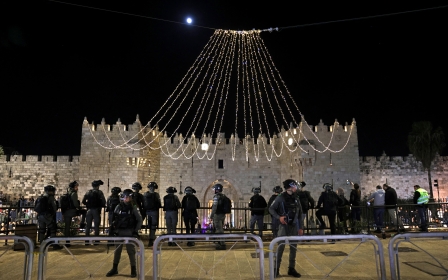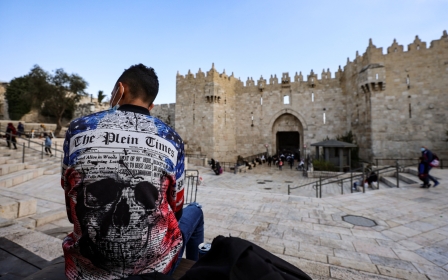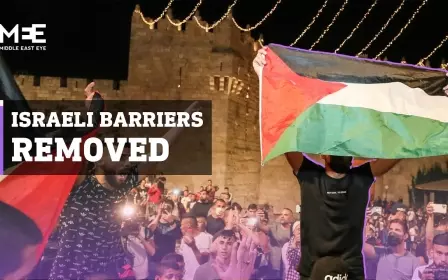Jerusalem: Israeli forces assault Palestinians celebrating Ramadan at Damascus Gate
Israeli security forces on Sunday arrested 10 Palestinians and wounded others on the second night of a crackdown on crowds gathering at Damascus Gate in occupied East Jerusalem.
At least 19 people were injured as police used rubber-coated steel bullets, stun grenades, batons, and mounted forces to disperse crowds.
Footage shared online showed Israeli forces, including undercover officers, beating and wounding Palestinians as they arrested them.
Translation: Watch: Occupation forces assault residents in the vicinity of Jerusalem.
New MEE newsletter: Jerusalem Dispatch
Sign up to get the latest insights and analysis on Israel-Palestine, alongside Turkey Unpacked and other MEE newsletters
On Saturday, four Palestinians were detained in the area as Israeli forces carried out a similar crackdown.
Israeli police said they arrested people for "rioting and attacking officers". One officer was injured by a bottle thrown in his face, police said in a statement.
On Monday morning, Israeli authorities detained and interrogated people visiting those injured in the crackdown at al-Makassed Hospital, according to the news website Arab48.
The attacks at Damascus Gate come amid heightened tensions and warnings of plans by Israeli settlers to storm al-Aqsa Mosque during the holy month of Ramadan, part of which will coincide with Jewish holidays.
On Sunday, Israeli prime minister Naftali Bennett spoke over the phone with Jordanian King Abdullah who emphasised the need to "avoid any escalation".
The king called for "removing all obstacles to Muslim prayers at the Al-Aqsa Mosque compound, particularly with the start of the holy month of Ramadan, and to prevent provocations that could lead to an escalation," a statement from the Jordanian royal court read.
'Provocative incursion'
The Sunday crackdown came hours after Israel’s foreign minister Yair Lapid visited Damascus Gate and the Old City to show support for the police.
His tour was criticised as a "provocative incursion" by various Palestinian factions, including the Palestine Authority (PA), Fatah, Hamas, and Islamic Jihad.
The PA's Ministry of Foreign Affairs said in a statement that it "condemns in the strongest terms the provocative incursion by Israeli foreign minister Yair Lapid in the Damascus Gate area in occupied Jerusalem".
"[The ministry] strongly condemns the promises he made to Jewish extremists to deploy more occupation forces and police in Jerusalem under the pretext of protecting them during the Jewish holidays."
The Damascus Gate, one of the main entrances to the Old City, is a popular meeting spot for Palestinians in Jerusalem and somewhere to gather and socialise. It is also often the scene of demonstrations against Israel.
During the holy month of Ramadan, crowds congregate outside the ancient gate - which Palestinians call Bab al-Amoud - to sing, eat, and drink.
Last year, Israel was forced to scrap a ban on limiting Palestinian access to the area during Ramadan that had sparked widespread protests and subsequent violent Israeli crackdowns.
Tensions quickly spread to Sheikh Jarrah, where Israel tried to expel Palestinian families to make way for Israeli settlers.
Amid the protests, Israeli forces attacked worshippers inside the courtyards of al-Aqsa Mosque.
The Israeli attacks prompted widespread demonstrations across the occupied West Bank and the Palestinian community inside Israel, and rockets were fired from armed groups in Gaza, triggering a large-scale Israeli military operation on the besieged strip.
Middle East Eye delivers independent and unrivalled coverage and analysis of the Middle East, North Africa and beyond. To learn more about republishing this content and the associated fees, please fill out this form. More about MEE can be found here.





